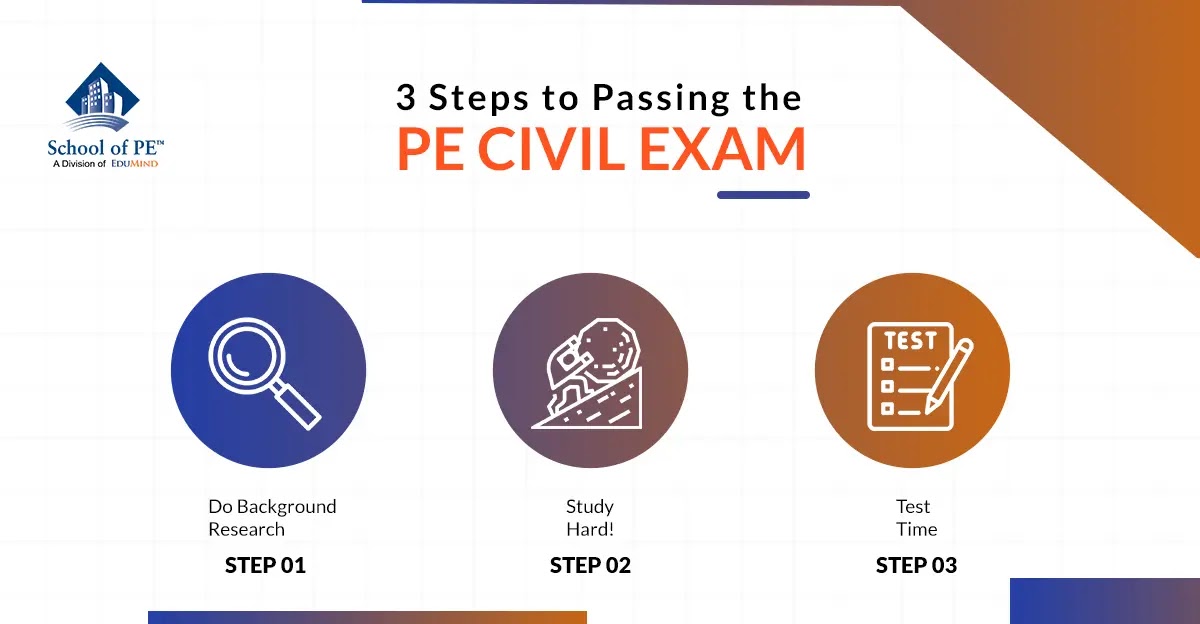When trying to get ready to take the PE Civil exam, it is often tough to figure out where to start. Do you study old college textbooks hoping the material will match what will be presented on the exam? Do you purchase practice exams and review them repeatedly until the questions are seared into your brain? Or do you perform countless Google searches on exam study tips until your computer battery is completely drained? Oddly enough, elements of all the above are conducive efforts to try and prepare yourself for the PE Civil exam. I have simplified my own exam preparation experience into three steps below that should help provide some guidance on where and how to start your own studies!

Step 1: Do Background Research
The PE Civil exam is a national exam that many individuals have successfully passed before you. If you have any friends or colleagues who have previously taken the exam (passed or not), reach out to them! Often, the way most people pass is by learning from the successes-and mistakes-of others' previous attempts. Next, go to NCEES' website and research the specific discipline you will be taking. Not only is this website where you will schedule your exam, but it is also full of useful resources for exam preparation. You will be able to find valuable information about many different elements of the exam like the format, which is one of the most important things to be ready for when taking the exam. Like tests in college, question formats and the allotted test time is something you will want to be aware of. The NCEES website, as well as others, will have useful information on the exact layout and format of the exam.
Step 2: Study Hard!
It is a long road ahead in terms of the study hours needed to pass the exam. You'll likely have to devote anywhere from 100-125 hours to exam preparation, if not more. You will want to spend your study time effectively; for instance, DON'T read a textbook cover to cover for hours on end analyzing every single word. Utilize the NCEES website to zero in on key concepts that will likely be covered in the exam and make those your focal point as you study. You can even take prep classes, like what School of PE offers, for the exam-which are well worth the money. Perhaps the best method of hands-on preparation for your exam will consist of solving practice problems. Practicing what you've learned is essential for memory retention. Some of the most effective study resources will allow you to not only solve practice problems, but also provide detailed solutions for the problems so you can cross check your work and pinpoint any errors you may have made.
Because this is the last time the PE Civil exam will be offered in the pencil-and-paper format, you will still be allowed to bring in your open book resources to the exam. You will need to organize these materials per NCEES standards. Utilize some of your study hours to create a reference system that you'll easily be able to sift through come test day. Using post-it tabs is a very popular method for quickly locating items in your textbook. After the October 2021 exam, however, the PE Civil will transition to CBT, in which case you will not be allowed any additional resources than the corresponding NCEES Reference Handbook.
Step 3: Test TimeThe time has come. It's test day. Get as much sleep as you can the night before. Remember, this October 2021 is the last time the exam will be offered in the pencil-and-paper format. When you head to the test facility, be sure to bring all your reference materials organized per NCEES standards. This is the last time you will have the opportunity to bring any other reference material than the NCEES Reference Handbook.
The test will be broken down into two four-hour portions which will amount to 80 total questions. You'll take the first, more generalized "Breadth" portion in the morning and the second, more discipline- specific "Depth" portion in the afternoon. Not only will it be important to manage your time well during the test, but also to pace yourself and not be afraid to skip questions you don't feel confident answering. The morning portion is mentally taxing-you can wear yourself out before the afternoon portion begins if you're not careful. As you go through each question, make sure to read the problem statement carefully, as there can be some curve balls thrown in.
After those 8 hours are up, it's time to reap the rewards of all your hard work and effort over the past few months. You will be glad you spent the necessary time to prepare when you receive a passing grade!
No comments :
Post a Comment